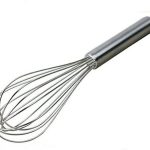 Cats have whiskers so they can gauge the size of hole they are tempted to slip through; chefs have whisks so that they can quickly beat an egg into a homogenous liquid. Both these tools take their name from a Germanic source meaning twig, because both whisks and whiskers resemble a small, pliable branch. Whisks, of course, are also used to sweep refuse from a table or counter, and thus in the early seventeenth century whisk became the name of a card game, so called because the discarded cards were “whisked away” after the hand was over; fifty years later, in the late seventeenth century, the name was corrupted to whist, which it has remained ever since. Another unlikely relative of whisk is verge, as in “I was on the verge of leaving.” This verge derives from the Latin virga, a word that developed from the same Indo-European source as whisk and that also meant twig. When it first appeared in English in the early fifteenth century, virga—or rather verge—was used to mean penis, but by the end of the fifteenth century it was also being used as the name of an official staff brandished in public by the Lord High Steward (the propriety of bestowing a word originally meaning twig on either of these mighty sceptres is debatable). Eventually, this official staff—the verge—came to stand for the area of land under the authority of the Lord High Steward. A person travelling out of that area would be on the verge when she got to the border, and as a result on the verge came to mean on the edge.
Cats have whiskers so they can gauge the size of hole they are tempted to slip through; chefs have whisks so that they can quickly beat an egg into a homogenous liquid. Both these tools take their name from a Germanic source meaning twig, because both whisks and whiskers resemble a small, pliable branch. Whisks, of course, are also used to sweep refuse from a table or counter, and thus in the early seventeenth century whisk became the name of a card game, so called because the discarded cards were “whisked away” after the hand was over; fifty years later, in the late seventeenth century, the name was corrupted to whist, which it has remained ever since. Another unlikely relative of whisk is verge, as in “I was on the verge of leaving.” This verge derives from the Latin virga, a word that developed from the same Indo-European source as whisk and that also meant twig. When it first appeared in English in the early fifteenth century, virga—or rather verge—was used to mean penis, but by the end of the fifteenth century it was also being used as the name of an official staff brandished in public by the Lord High Steward (the propriety of bestowing a word originally meaning twig on either of these mighty sceptres is debatable). Eventually, this official staff—the verge—came to stand for the area of land under the authority of the Lord High Steward. A person travelling out of that area would be on the verge when she got to the border, and as a result on the verge came to mean on the edge.
